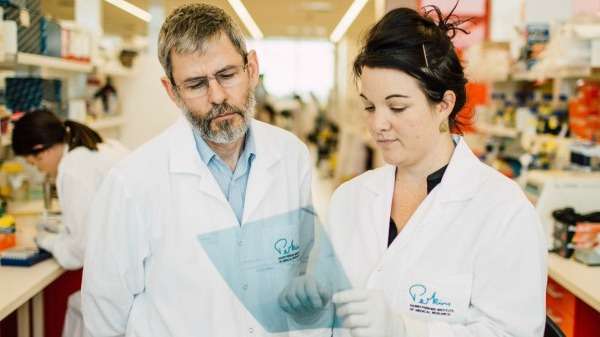Gene discovery in debilitating muscle disorder

A coordinated research effort identified one of the genes involved in a debilitating muscle disorder.
Perkins Laboratory for Molecular Genetics Neurogenetic Diseases Group, headed by Professor Nigel Laing, which is globally recognised for its research into an inherited condition known as nemaline myopathy, coordinated the worldwide research effort that led to the discovery of the gene KLHL40.
The KLHL40 gene plays a major role in muscle development and function. Mutations of this gene were shown to cause 20 per cent of the cases of severe version of nemaline myopathy. Babies with this disorder have severe muscle weakness, allowing little movement within the womb, as well as fractures, respiratory failure and swallowing difficulties at birth.
Dr Gina Ravenscroft, who is based at Perkin's campus in Nedlands, largely organised the study.
"Our research began with a Western Australian couple whose baby died after five days and a Turkish couple who tragically lost two babies in a row," Dr Ravenscroft says.
"As our study expanded, researchers around the world studied DNA samples from families in countries including Japan, Vietnam, France, Turkey, Italy, Israel and Sweden," she says.
Prof Laing says next generation DNA sequencing has allowed us the capacity to capture and sequence 20,000 human genes simultaneously, so the discovery of genes like KLH40 is happening more quickly.
"Finding disease genes in the good old days you either needed big families or you guessed what the gene was," Prof Laing says.
"The Harry Perkins Neurogenetic Diseases Group just made 15 disease gene discoveries between 1987 and 2011, but now, using next generation DNA sequencing, have identified another 15 disease genes in the last five years," he says.
"We have another 2500 genes left to discover and so we need to find one new disease gene every day from now until December 2020 to reach that goal."
Prof Laing says the discovery of new diseases is an extremely important part of good patient care.
"For one-third of people with genetic disorders it can take five to 20 years for them to get an accurate diagnosis of what they've got," Prof Laing says.
"So putting a label on an illness, even though you may not be able to treat it, is really important for the affected person and their family and friends," he says.
This article first appeared on ScienceNetwork Western Australia a science news website based at Scitech.

















